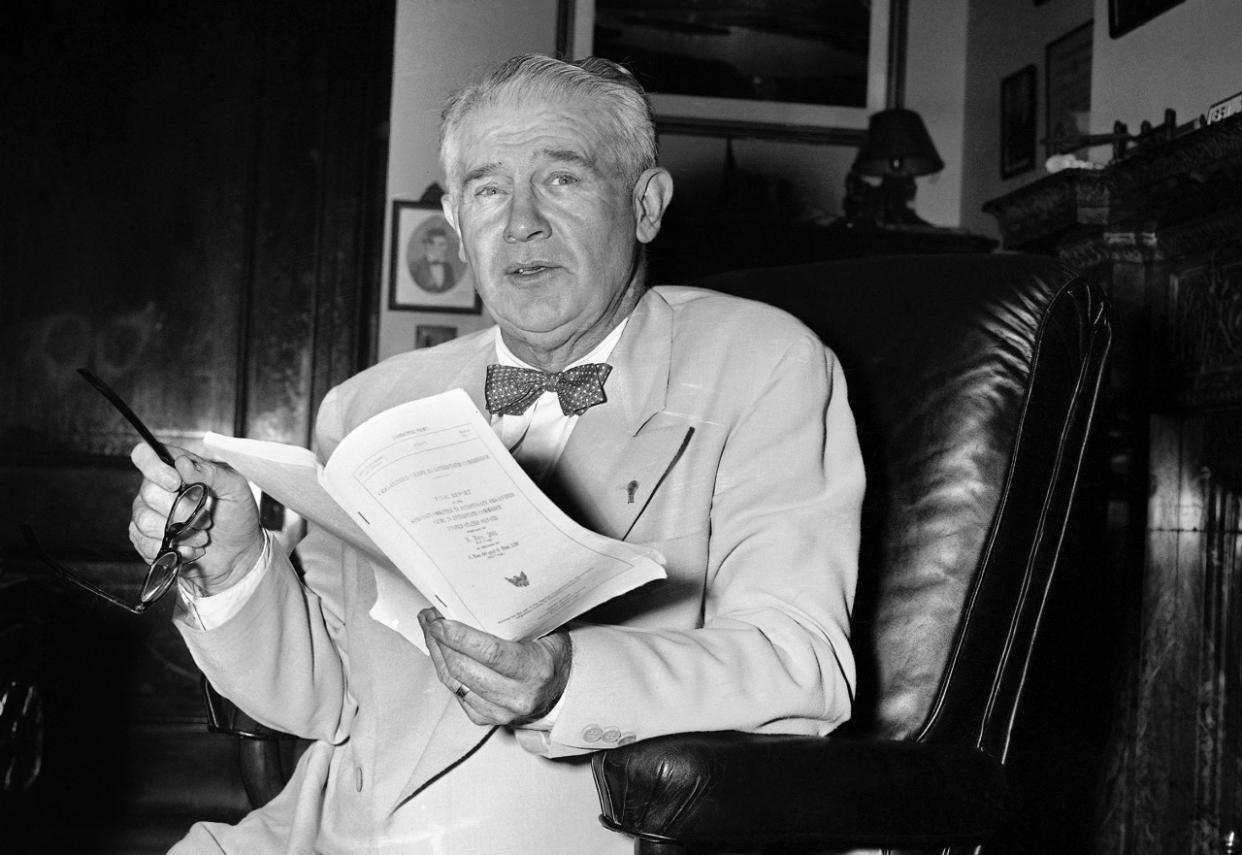U.S. senator urges probe into Cold War-era antigay blackmail plot

Sen. Lester Hunt, D-Wyo., in Washington in 1951. (Photo: Henry Griffin/AP)
In the wake of disclosures in a Yahoo News documentary , the Justice Department is facing new calls to investigate a Cold War-era antigay blackmail plot that led to the 1954 suicide of Wyoming Sen. Lester Hunt.
Wisconsin Sen. Tammy Baldwin — the first openly lesbian member of Congress — asks Attorney General Loretta Lynch in a letter to “help shine a light on a dark chapter in the history of the Senate” by investigating the roles that three U.S. senators played in hounding Hunt to his death by exploiting his son’s arrest for soliciting gay sex in Lafayette Park, across the street from the White House.
The death of Hunt has been shrouded in mystery and controversy ever since the Wyoming Democrat went to his office on June 19, 1954, with a rifle and killed himself. Although the details were covered up for years, the event became the inspiration for the 1959 bestselling novel “ Advise and Consent,” later a popular Hollywood movie that had a huge cultural impact due to its frank depiction of the ways in which homosexuality was used as a political weapon at the time.
“While decades have passed since this tragic incident, it remains a troubling example of the misdeeds of the McCarthy era and the role homophobia and bigotry has played in the history of our nation, including at the highest levels of federal government,” Baldwin wrote in a letter to Lynch last week. (A Justice Department spokeswoman said officials had not yet had a chance to review the letter and therefore couldn’t comment.)

U.S. Sen. Tammy Baldwin, D-Wis., speaks during a news conference on LGBT discrimination July 23, 2015, on Capitol Hill in Washington. (Photo: Alex Wong/Getty Images)
Given that the purported culprits behind the blackmail of Hunt are long deceased, Baldwin acknowledged that she doesn’t expect any prosecutions arising from the decades-old case. But she said in a phone interview that she hopes a reexamination of government files could clear up the historical record — not only about what happened to Hunt, but also about the sordid tactics of the era. “It’s a stunning example of a very sad chapter in American history in terms of the persecution of gays,” she said in the interview.
Baldwin’s letter is among three that have been written to Lynch following the recent release of the Yahoo News documentary “Uniquely Nasty: The U.S. Government’s War on Gays,” which explores the circumstances behind Sen. Hunt’s death.
The film contains the first on-camera interview with Lester Hunt Jr., now 87 and living in Chicago, in which the late senator’s son describes how he was arrested by an undercover police officer after making a homosexual advance in Lafayette Park in 1953.
At first, Washington, D.C., police chose not to pursue the case, and the charges were dropped. But as Hunt Jr. reveals in “Uniquely Nasty,” two U.S. senators — Styles Bridges of New Hampshire and Herman Welker of Idaho, close allies of the anti-Communist demagogue Sen. Joe McCarthy — intervened with Washington prosecutors and demanded that he be brought to trial on morals charges. (Hunt Jr. was eventually convicted and fined $100.)
As Hunt Jr. relates in the film, the senators then blackmailed his father, threatening to flood the state of Wyoming with 25,000 pamphlets about his arrest for soliciting gay sex if the senator didn’t give up his seat before the 1954 elections, when control of the Senate was at stake.

Lester Hunt Jr. during an interview with Yahoo News. (Photo: Yahoo News Video)
“They were going to canvass every house … in every town that they could and tell them what was going in the Hunt family,” Hunt Jr. says in the documentary. “They were a–holes. Bastards. You just don’t engage in that kind of political activity.”
What happened to Sen. Hunt “just passes all bounds of decency,” says former Republican Sen. Alan Simpson, who knew Hunt and also appears in the film. “This is absolutely beyond the pale of politics. It’s a couple of sons of bitches doing evil things like out of ‘Macbeth.’”
After the release of the film, Hunt Jr., a retired community organizer who is now a grandfather, wrote his own letter to Lynch in July asking that the Justice Department review and release its files on his father’s death.
“It is shocking to me that no formal investigation was ever conducted by the Senate or the Justice Department,” Hunt Jr. wrote in his letter. “Given the egregious nature of the matter, it seems to me that although belated, a formal review of the case is warranted, and I am writing to ask that it be done.”
The letters were coordinated by Charles Francis, president of the Mattachine Society of Washington, a gay civil rights group whose lawyers separately wrote Lynch last week also seeking a review of government files on the Hunt suicide.
“This is Emmett Till territory,” Francis said, referring to the 1955 kidnapping and murder of a 14-year-old African-American in Mississippi, whose death was reinvestigated by the Justice Department in recent years after demands by civil rights leaders and the passage of a law reopening “cold case” civil rights cases by Congress. “It’s an ancient tragedy that has immediate relevance.”
Hunt’s death came during a tumultuous period when the Senate was engulfed in the Army-McCarthy hearings, triggered by claims by the Wisconsin senator that Army generals were protecting Communists. (A major backdrop to the hearings was rumors about the sexual orientation of multiple players and widespread assumptions that gays were security risks who were every bit as dangerous as Communists because they might be susceptible to Soviet blackmail.)
The suicide of Hunt — an outspoken foe of McCarthy — shocked members on both sides of the aisle and may have helped turn the tide against McCarthy. “I can think of few events which cast a greater pall of gloom over the Senate,” then Senate Democratic leader Lyndon Johnson said at the time.
The official explanation for the suicide was that Hunt was despairing over deteriorating health issues. But within days of the senator’s death, veteran Washington columnist Drew Pearson first linked the suicide to a blackmail plot by Bridges and Welker, calling it “one of the lowest types of political pressure this writer has seen in many years.”
The GOP senators adamantly denied Pearson’s allegations and mounted a campaign to discredit him, even threatening to sue newspapers that reprinted it. (One of Bridges’ main supporters in New Hampshire, William Loeb, the publisher of the staunchly conservative newspaper the Manchester Union Leader, blasted the Pearson column in an editorial under the headline, “Pro-Communist Attack on Bridges.”)

Among McCarthy’s allies were Republican Senators Styles Bridges of New Hampshire and Herman Welker of Idaho. (Photo: New Hampshire Archives and Records Management)
But in recent years, Wyoming politician and historian Rodger McDaniel, author of the 2013 book, “ Dying for Joe McCarthy’s Sins: The Suicide of Wyoming Senator Lester Hunt ,” uncovered new evidence that supports the original Pearson column. Digging through Bridges’ own Senate files in New Hampshire state archives, he found records showing that Bridges and Welker had directly intervened in Lester Hunt Jr.’s case, summoning the chief of the Washington, D.C., vice squad, detective Roy Blick, three times to Capitol Hill to answer questions about his handling of it, suggesting he had taken a bribe to let the senator’s son off and demanding to know why it had not been taken to prosecution.
Equally telling, McDaniel found long-suppressed notes from a 1966 interview with a former Wyoming governor, Leslie Miller, recounting how a despondent Sen. Hunt told him shortly before his death that he was being “blackmailed” by the two senators, including their threat to mail pamphlets about his son’s arrest to Wyoming voters.
One key unanswered question is the role of McCarthy himself. McDaniel contends in his book that he was complicit, noting that on the day before Hunt took his life, the notorious Communist inquisitor had told the press that he planned to investigate an unnamed fellow senator “who had fixed a case.” But, as Francis notes, a large portion of McCarthy’s Senate files remain sealed at Marquette University, making it difficult to reach firm conclusions about the senator’s role.
One historical irony is that Baldwin, a Democrat who was elected in 2012, holds the same seat as McCarthy — another reason for her interest in the Hunt case. “I think about the lives that were ruined — good people’s lives that were ruined during the McCarthy era because of McCarthy’s tactics,” she said in the telephone interview. “That point is not lost on me.”

The body of Sen. Lester Hunt, D-Wyo., is carried from Trinity Episcopal Church in Washington on June 21, 1954, after funeral services. (Photo: William J. Smith/AP)



